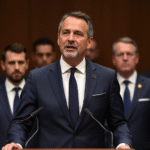Introduction
Comparisons between the populist styles of Mexico’s former president and the current U.S. president are not forced, but rather, it’s their scopes and personalities that differ.
Populist Leadership Traits
Charismatic leaders often surround themselves with teams that don’t overshadow their brilliance and eliminate any competition that might be perceived as antagonistic.
Unlike statesmen, whose cabinets allow for brilliant personalities in multiple positions and tasks unrelated to the leader’s abilities, populists prefer “yes-men” in cabinet positions. Decisions are centralized around the leader, and there won’t be any standout figures.
Mexico’s Former President
In Mexico, the characters accompanying López Obrador were a series of puppets who strictly adhered to the sexenal maxim of 10% capability in exchange for 90% loyalty.
U.S. Current President
Donald Trump isn’t much different, and it’s clear that some of his cabinet members don’t fit the ideal profiles for their respective positions.
Many officials possess something like 10% knowledge, 90% MAGA loyalty. However, the size of the government they represent makes their lack of expertise more noticeable.
Technical Positions and Evidence
Populist leaders rarely neglect highly specialized, technical areas crucial to public finance.
During Trump’s presidency in the U.S., both Steven Mnuchin (during his first term) and Scott Bessent (current Treasury Secretary) had extensive backgrounds and recognition in financial markets.
Treasury Secretary Bessent cannot afford any significant errors, such as implicating three Mexican financial entities as accomplices to organized crime without sufficient evidence.
FinCEN’s Accusations and Evidence
FinCEN, the Financial Crimes Enforcement Network under the Treasury Department, issued an alert about fentanyl trafficking financing between Mexican cartels and Chinese companies, totaling $1.4 billion in reported suspicious transactions.
In the analysis “Fentanyl-Related Illicit Finance: 2024 Threat Pattern & Trend Information,” FinCEN detailed sophisticated money-laundering methods, lacking only the names of the institutions involved.
It’s highly unlikely that such a communication wasn’t preceded by a notification to Mexican authorities, who now claim surprise.
Key Questions and Answers
- Q: How do the leadership styles of Mexico’s former president and the U.S. current president compare?
A: Their scopes and personalities differ, although both exhibit populist traits. Mexico’s former president surrounded himself with loyal “yes-men,” while the U.S. current president’s cabinet members sometimes lacked ideal qualifications for their positions.
- Q: What are the implications of populist leadership on technical positions?
A: Populist leaders rarely neglect highly specialized, technical areas crucial to public finance.
- Q: What was the nature of FinCEN’s accusations against Mexican financial entities?
A: FinCEN accused three Mexican financial entities of being accomplices to organized crime in fentanyl trafficking financing, without sufficient evidence.
- Q: Why is it crucial for Treasury Secretary Bessent to provide evidence?
A: A significant error, such as implicating Mexican entities without proof, could be devastating for his authority.
- Q: How did FinCEN’s alert address fentanyl trafficking financing?
A: FinCEN’s alert detailed sophisticated money-laundering methods used in fentanyl trafficking financing between Mexican cartels and Chinese companies.






